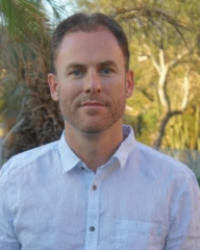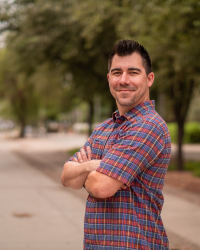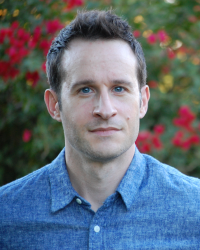Academic Partners
Arizona State University
William Corbin, Ph.D.
William Corbin is a Full Professor and Director of Graduate Studies for the Department of Psychology. The goals of his program of research are to improve understanding of factors that lead to the development of alcohol-related problems, and to develop effective programs for reducing alcohol-related harm.
Rick Cruz, Ph.D.
Dr. Rick A. Cruz is an assistant professor in the Department of Psychology at Arizona State University. He is a clinical child psychologist by training, and his research focuses on the development, prevention and treatment of mental health and substance use problems among diverse youths and families. His work has a special focus on Latinx children, adolescents and young adults. His research has suggested that it is beneficial for Latinx youth and families to maintain their cultural heritage (for example, Spanish language use, and strong family values), since this is associated with better mental health and less substance use among adolescents. Going forward, Dr. Cruz is interested in developing more effective strategies for youth substance use prevention and treatment, including understanding how to expand the implementation of evidence-based interventions in schools, community mental health agencies, and primary care settings. He is also interested in finding ways to enhance interventions through technology (e.g., text messaging, smartphone apps).
Raminta Daniulaityte, Ph.D.
Raminta Daniulaityte is an Associate Professor in the College of Health Solutions. Her work involves conducting substance use research, including community-based studies with individuals who use illicit opioids and other drugs, ethnographic and mixed methods research to inform epidemiology of emerging substance use trends, and web-based research to develop more effective strategies for tracking changing practices of cannabis, novel synthetic opioid and other drug use. Dr. Daniulaityte has experience in leading interdisciplinary collaborations (e.g., computer science, chemistry and forensic toxicology) to advance innovation and timeliness in substance use epidemiology research.
Kelly Cue Davis, Ph.D.
Kelly Cue Davis is an Associate Professor in the Edson College of Nursing and Health Innovation as well as a licensed clinical psychologist. Her primary research interests include health risk behaviors, with a particular emphasis on the intersection of sexual violence, sexual risk, and substance use. Her work has targeted sexual assault assessment, response, prevention, and policy in both K-12 and higher education institutions as well the military and legal system, with an emphasis on the role of alcohol in sexual assault perpetration and victimization.
Rolf Halden, Ph.D.
Rolf Halden is founding director of the Biodesign Center for Environmental Health Engineering, professor in the Ira A. Fulton School for Sustainable Engineering and the Built Environment, and global futures scientist at the Julie Ann Wrigley Global Futures Laboratory. Halden is a noted expert in determining where in the environment mass-produced chemicals wind up, quantifying environmental toxic exposures, and understanding their impact on health, and how to remove these harmful agents from consumer products and contaminated environments. He is also part of an ASU team studying the potential health risks of plastics, microplastics and nanoplastics in water, food, commercial products and biological specimens.
Justin Jager, Ph.D.
Justin Jager is an Associate Professor of Family and Human Development within the T. Denny Sanford School of Social and Family Dynamics. He is a developmental psychologist whose research program is devoted to unpacking complex person-context interactions across adolescence and middle adulthood. Because these periods of the life course are critical for the formation and progression of substance use and mental health problems, a good deal of his research focuses on these outcomes. To better capture the person in context, his research uses novel and sophisticated analytical approaches; as a result, he is skilled in the application of complex, developmental methods (e.g., age-period-cohort growth curve modeling, piece-wise latent growth modeling, latent variable interactions, and pattern-centered analysis). He has published extensively on age, cohort, and period effects in substance use and abuse use with a particular focus on age by cohort interactions, or how developmental pathways vary by cohort. More recently his research, which is funded by NIAAA, has particularly focused on delineating historical time trends in alcohol use and disorder in the United States, how these trends vary by age and gender, and why these trends are occurring.
Nicole Janich, Ph.D.
Dr. Nicole Janich is a Research Assistant Professor and has worked at the Arizona State University’s (ASU) Center for Applied Behavioral Health Policy (CABHP) for nearly 12 years. She earned her PhD in Social Work from ASU with a dissertation focus on integrated care in behavioral health settings and implementation challenges of integrated care. Dr.Janich’s work has largely been in the field of Implementation Science. Specifically, implementation of evidence-based practices in health care and behavioral health settings. Additionally, much of her work and interests include engaging in community-embedded research working alongside providers using participatory methods to conduct evaluations and assist with the implementation of evidence-based practices (EBP). Outside of her work at the CABHP, Nicole has taught graduate level classes related to research, evaluation, and social policy, and currently serves as the President for the Arizona Evaluation Network.
Tina Jiwatram-Negron, Ph.D.
Tina Jiwatram-Negron is an Assistant Professor in the School of Social Work and faculty of the Office of Gender-Based Violence in the Watts College of Public Service and Community Solutions. She is also a Faculty Research Affiliate at the Southwest Interdisciplinary Research Center and Global Center for Applied Health Research at ASU, and PI/Director of InCommunity Lab. Dr. Jiwatram-Negron’s research focuses on examining and understanding gender-based violence and associated health and mental health risks among socially and economically vulnerable populations, including women who use and misuse drugs and alcohol. In partnership with community-based organizations domestically and internationally, Dr. Jiwatram-Negron also aims to reduce and eliminate disparities through the co-development of trauma-informed intervention solutions.
Maxwell Leung, Ph.D.
Maxwell Leung is an Assistant Professor in the School of Mathematical and Natural Sciences. Dr. Leung is interested in the use pattern, contaminant exposure, and risk awareness of patients with Parkinson's Disease and autism who use cannabis-based products - including cannabidiol - for medical purposes.
Flavio Marsiglia, Ph.D.
Flavio Marsiglia is a Regents Professor at the School of Social Work and Principal Investigator of the Specialized Center of Excellence at the Southwest Interdisciplinary Research Center. He is also the founder and director of the Global Center for Applied Health Research. Professor Marsiglia's research on cultural diversity and youth substance use is widely recognized, highly influential in the prevention field, and credited with a measurable reduction in drug use and other high-risk behaviors among youth in Arizona, across the US and in other countries. He has developed and tested culturally grounded interventions to prevent substance abuse especially among Latino and other minority populations of the Southwest.
Matthew Martin, Ph.D.
Matthew Martin is a Clinical Assistant Professor in the College of Health Solutions and has a research appointment with Mayo Clinic Arizona. His research interests include translational behavioral medicine, clinician behavior change, and implementation research. Current projects include mapping MOUD across Arizona, expanding buprenorphine waiver training among nurse practitioners, and improving MOUD care transition between correctional and community health.
Madeline Meier, Ph.D.
Madeline Meier is an associate professor in the Department of Psychology at Arizona State University. She received her PhD from the University of Missouri; completed her clinical internship at the Durham Veterans Affairs Medical Center; and completed her postdoctoral training at Duke University. Her research uses prospective longitudinal and case-control designs to understand the causes, course, and consequences of problematic substance use. She has published over 25 articles on cannabis use and the implications of long-term cannabis use for cognitive functioning, psychosocial functioning, mental health, and physical health. Her cannabis work has received extensive attention from both the scientific community and the media, and is being used by scientists, policy makers, and practitioners.
Chung Jung Mun, Ph.D.
Chung Jung Mun is an Assistant Professor in the Edson College of Nursing and Health Innovation. He directs the Biobehavioral Pain, Addiction, Sleep, and Momentary Experience (Bi-PAS ME) Research Laboratory. His program of research includes investigating biopsychosocial individual differences and momentary dynamics of pain processing and coping; the role of sleep/circadian disturbances and cannabis/cannabinoid intake in pain and opioid use; and technology-based intervention programs for chronic pain and addiction.
Karey O'Hara, Ph.D.
Karey L. O’Hara, Ph.D. is an Assistant Research Professor of Psychology. She conducts research on risk and protective factors that influence how children and parents adjust after stressful events in the family, such as parental divorce, bereavement, and incarceration. Currently, her research focuses on designing, optimizing, and evaluating interventions to promote the health and well-being of children who experience these challenging family stressors. Her work is currently funded by a career development award from the National Institute of Mental Health (K01MH120321).
M. Foster Olive, Ph.D.
M. Foster Olive heads the Addiction Neuroscience Laboratory at Arizona State University. His group is interested in examining how abused drugs affect the brain on a neurobiological level. His research has been published in journals such as Biological Psychiatry, Journal of Neuroscience, and Nature Neuroscience, and he currently serves on the editorial boards for Addiction Biology, Neuropharmacology, and Frontiers in Pharmacology.
Danielle Pandika, Ph.D.
Danielle is a research scientist at the Social Development Research Group at the University of Washington School of Social Work. She researches risk and protective processes in the development of substance use problems and problem behavior and also has an interest in advancing health equity. Her ongoing work includes examining opioid misuse in young adulthood, tobacco use among rural youth (Latinx and non-Latinx), and long-term intervention effects on substance use and parenting behavior trajectories from adolescence to young adulthood.
Julie Patock-Peckham, Ph.D.
Julie Patock-Peckham is an Assistant Research Professor in the Department of Psychology. She is the director of SAIL (Social Addictions Impulse Lab; formerly the Social Health Research Group). Dr. Patock sits on the editorial board of Journal of Studies on Alcohol and Drugs and reviews for eleven other peer reviewed journals in the areas of personality, addictions, and adolescent health.
Lela Rankin, Ph.D.
Lela Rankin is a Professor in the School of Social Work, Tucson at Arizona State University. She completed her doctoral and post-doctoral training in child development and parenting and she is also a certified babywearing educator. She has statistical expertise in the analysis of developmental change and change associated with intervention studies across a variety of settings (schools, hospitals, in-home). Dr. Rankin’s scholarship focuses on interventions with families using an attachment framework. She has pioneered empirical work on infant carrying (i.e., babywearing) and has found health and mental-health benefits for vulnerable mothers and infants, particularly for mothers with newborns born opioid-exposed.
William Riley, Ph.D.
William Riley is professor for the Science of Health Care Delivery program in the College of Health Solutions. Riley is a leading authority in health care finance and serves as the director of the National Safety Net Advancement Center, which assists safety net organizations respond to health care payment reform. Riley is also a national and international expert in quality improvement methods, techniques, and implementation. He currently leads eight translational research projects in international settings, implementing evidence based practices for underserved populations, value-based care, and multisector alignment to achieve a culture of health.
Heather Ross, Ph.D.
Heather Ross holds a joint appointment as Clinical Associate Professor in the School for the Future of Innovation in Society and the Edson College of Nursing and Health Innovation. She is also a Senior Global Futures Scientist in the Julie Ann Wrigley Global Futures Laboratory. She brings expertise in healthcare practice, technology policy, and implementation science to a broad portfolio of applied research initiatives. Her current projects include sensor-based human technology interaction; solar-powered offline digital libraries and health education in remote, underresourced, and hostile environments globally; and innovative evidence-based solutions to complex system challenges in mental health and public safety in the City of Phoenix.
Federico Sanabria, Ph.D.
Federico Sanabria is an Associate Professor in the Department of Psychology. He studies basic behavioral and cognitive processes underlying behavioral regulation in animal models, and applies this research to the study of psychiatric disorders, primarily substance abuse and attention deficit hyperactivity disorder (ADHD).
Jinni Su, Ph.D.
Jinni Su is an Assistant Professor in the Department of Psychology. Her research focuses on how genetic and environmental influences contribute to the development of substance use and related behavioral and emotional health outcomes in diverse populations, particularly during adolescence and young adulthood. She is passionate about increasing representation of racial/ethnic minority populations in genetic research and takes a cultural genomics approach to study the interplay between genetic predispositions and sociocultural factors in predicting substance use and related outcomes among racial/ethnic minority youth.
Yi-Yuan Tang, Ph.D.
Yi-Yuan Tang is a professor in the College of Health Solutions. He has an interdisciplinary and cross-cultural background, experience, and expertise in the areas of cognitive, affective, cultural, developmental and health neuroscience and psychology, health sciences, prevention and intervention science. He uses multilevel methodologies such as multimodal neuroimaging and neural modeling, interventional, psychosocial and epigenetic methods to study the mechanisms of core mental processes (e.g., self-control, emotion regulation, stress resilience, reinforcement learning, and decision-making) related to cognitive, physical and mental health and conscious/unconscious regulation and changes in healthy behavior, habit and lifestyles, and to develop and implement evidence-based training or interventions to prevent and ameliorate behavioral problems and mental disorders in health and patient populations over the lifespan. Tang published over 300 peer-reviewed articles and 9 books, and his research has been supported by the NIH and DoD.
Daoqin Tong, Ph.D.
Daoqin Tong is an Associate Professor in the School of Geographical Sciences and Urban Planning. Dr. Tong’s research has mainly focused on the use of spatial analytics including spatial optimization, geographic information system (GIS), spatial statistics and big data to support urban and regional studies concerning locational decisions, transportation, food access, and public health. Her recent projects include modeling spatial data uncertainty, collaborative geodesign for alternative fuel locations, modeling vector-borne disease spread at various spatial scales, analyzing issues with urban food access and urban agriculture, and examining rainwater as potential resource for water independence in desert cities.
Sharlene Wolchik, Ph.D.
Sharlene Wolchik is a professor in the Department of Psychology and Director of the REACH Institute. Wolchik focuses on understanding the variablity in children's adjustment to the family transitions of parental divorce or parental death. She conducts research that identifies moderators and mediators of children's adjustment to these situations and designs and experimentally evaluates theory-based preventive interventions for children and parents who experience these stressors. She also conducts longitudinal studies of the long-term effects of preventive interventions for children from divorced families.
Shiyou Wu, Ph.D.
Shiyou Wu is an Assistant Professor at the School of Social Work. Dr. Wu also serves as the Assistant Director for China Initiatives at the ASU Global Center for Applied Health Research, and as Assistant Director of ASU Office of Global Social Work. He is also a faculty affiliate of the ASU Southwest Interdisciplinary Research Center (SIRC) and Center for Applied Behavioral Health Policy. Wu uses a social determinants of health framework and a person-in-environment perspective to explore the multi-level (individual, interpersonal, household, community, societal) determinants of youth substance use and other related health outcomes, especially among youth from impoverished families (e.g., welfare recipients). His research interests also include design and development of social interventions, with special emphasis on interventions to prevent substance use and reduce health disparities among youth.
University of Arizona
Alicia Allen, Ph.D.
Alicia Allen is an Assistant Professor in Clinical Translational Sciences, Family and Community Medicine, and Public Health as well as the Director of the RENEW Team. Dr. Allen's current research focuses on topics that occur in the intersection between substance misuse (e.g., nicotine/tobacco, cannabis, opioids) and women's health (e.g., pregnancy, postpartum, hormonal contraceptive use). As a behavioral epidemiologist, she is particularly interested in research study design and evaluating causality. She has conducted randomized clinical trials, controlled cross-over trials, and cross-sectional online surveys, as well as analyzed data from large epidemiological datasets.
Anne Boustead, Ph.D.
Anne Boustead is an Assistant Professor in the School of Government and Public Policy. Dr. Boustead researches legal and policy issues related to drug policy, policing, and privacy. Her interests include evaluating medical and recreational cannabis legalization in the United States, with particular emphasis on how variation in cannabis laws may impact those evaluations.
Northern Arizona University
Julie Baldwin, Ph.D.
Julie Baldwin is a Regents’ Professor in the Department of Health Sciences and the Director of the Center for Health Equity Research (CHER) at NAU. Dr. Baldwin’s research over the years has focused on both infectious and chronic disease prevention. Cross-cutting themes which have characterized her work include: utilizing community-based participatory research approaches, working with underserved and/or marginalized populations, and addressing health disparities by developing and implementing culturally centered public health interventions.




























